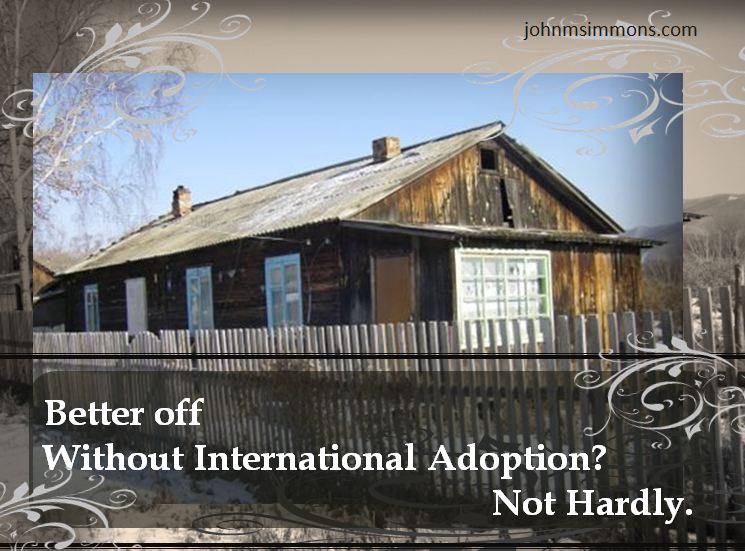Better off Without International Adoption? Not Hardly.
Of course there are days when I am ashamed of some of the people on my side of the inter-country adoption fence. Some of the black eyes the adoption industry has acquired have been well deserved, not the least of those being the shiner delivered for becoming a massive “industry.”
There is no doubt that any adoptee (actual orphan or social orphan) would have lived a much different life had they not been adopted. In a (statistically) few cases, it can be proven beyond reasonable doubt that an adoption-less life would have been better for the person who lost their first family. However, to indicate that ridding the world of international adoption would make life better for children and families is wrong.
I went back to Russia on several occasions to retrieve information about my children’s histories. I returned without them, before they were in a position to participate, because I was in a race against time. I needed to get the information before it was too late. You see, I knew that my daughters’ first mother had aged out of an orphanage. That meant she had a life expectancy of thirty-one. Oksana gave birth to my oldest daughter when she was nineteen, just a few years after aging out of her orphanage. My oldest daughter was fifteen when she joined our family, not having seen her first mother since being removed from the horrifically abusive home when she was seven. That meant the first mother was about thirty-two the first time I went back, following our adoptions. She was either dead or an ancient woman for her demographic.
There was no love lost between these orphanage workers and either of the two-generational residents from that family.
As I spoke with orphanage workers to gather information, (adoption records in Russia are even more secretive than ones in the U.S.) I was told that the first mother of my daughters, Oksana Koshkina, grew up in the same orphanage that my oldest daughter was in; an orphanage reserved for children with behavioral problems. There was no love lost between these orphanage workers and either of the two-generational residents from that family. One of the workers told me that if you could make the mother and daughter the same age, and stand them side-by-side, you wouldn’t be able to tell them apart. “They look the same, they act the same, they are the same,” she said.
On my first visit, I didn’t find Oksana. Social workers told me that she had relocated and had not registered her new address as required by law. Maybe that was true and maybe it wasn’t. I was snooping around in places I wasn’t supposed to, and asking questions that they were forbidden to answer. On that trip I only succeed in shooting some pictures of a shack that my older daughters had lived in, before Oksana lost custody of them. Soon after, she was evicted from that hovel and forced to find an abandoned residence to give birth to another two girls.
You know how these people live.
Later, I went back to Russia armed with an address of where my two youngest daughters had been when they were taken away by the State. Sarah had told me there wasn’t any electricity or water in that formerly abandoned house, and that she remembered cracks in the wall where light came through. She told me that the floor was dirt and when it snowed outside, there would be snow on the floor. When I finally found the address in the village, there were only portions from two of the original concrete walls that remained from the small house. Any wood from a caved-in roof had gone up a neighbor’s chimney long before.
My translator spoke to an old woman sitting on the porch next door, peeling potatoes. She said she knew Oksana, but she had moved to another part of the village. Not long after the move, she had died. When asked about Oksana’s demise, the old babushka said; “Who knows? You know how these people live.”
My daughters were not taken away because Oksana was poor. They were taken away because they were neglected, tortured and abused. At least two of them almost died. All four of them can show you scars. They needed to be removed from that home. They needed a new family. They would not have gotten one in their home country, but they did get one.
Emily was a victim of circumstance just like her social-orphan mother, who was raised by the same “system.”
Was it “happily-ever-after?” Please. Will they live happy lives? Perhaps. They will battle demons for the rest of their lives. Maybe they will have the ability to choose happiness as adults and maybe they won’t. They might choose to be angry. If they do, so-be-it.
I didn’t adopt them to be idolized. As much as I would like to be appreciated by them, that isn’t why I gave them an opportunity. I did it because I wanted them to have a chance; appreciated or not.
Orphanage workers had written off my oldest daughter to the fate of her mother. If they weren’t happy about what they believed would happen to their young nemesis, they at least thought she was deserving of the life. I couldn’t see it that way regardless of her behaviors. Emily was a victim of circumstance just like her social-orphan mother, who was raised by the same “system.”
If Emily struggles her entire life, she will not live her first mother’s fate. She won’t go from abandoned house to abandoned house, selling the only thing she has to sell, giving birth to seven children to be placed in the system. She won’t expire from who-knows-what because that is how “those people” live.
The foundation of adoption in, from, or related to any country involves pain, loss and unhappiness. But there is happiness, joy and acceptance in adoption, too. With all its good and bad, this imperfect solution is necessary in many, many cases. As a child, Oksana was saved from death. But she was never given a chance at life. I don’t believe that child had more of a right to a family than children in the U.S., or any other Western Country. I don’t believe her rights to a family were less. Even so, a lack of intervention was tragic for that child and it got worse as she became an adult. If only someone from any country had adopted an angry and unappreciative Oksana, and then stood by her; forever.
Often, readers receive as much help from other readers in the comments section as they do from the blog article, itself. Please be generous with your thoughts and experiences in the comments section. There are lots of people who need what you have to share. This is your chance to help them.
Read more articles by John M. Simmons about Adopt
Return to John M. Simmons’ blog
Ensure you don’t miss anything by signing up for Our Weekly Newsletter. This is all you need to be qualified for occasional giveaways like the Kindle Fire that Kristy Goulart won in July!


